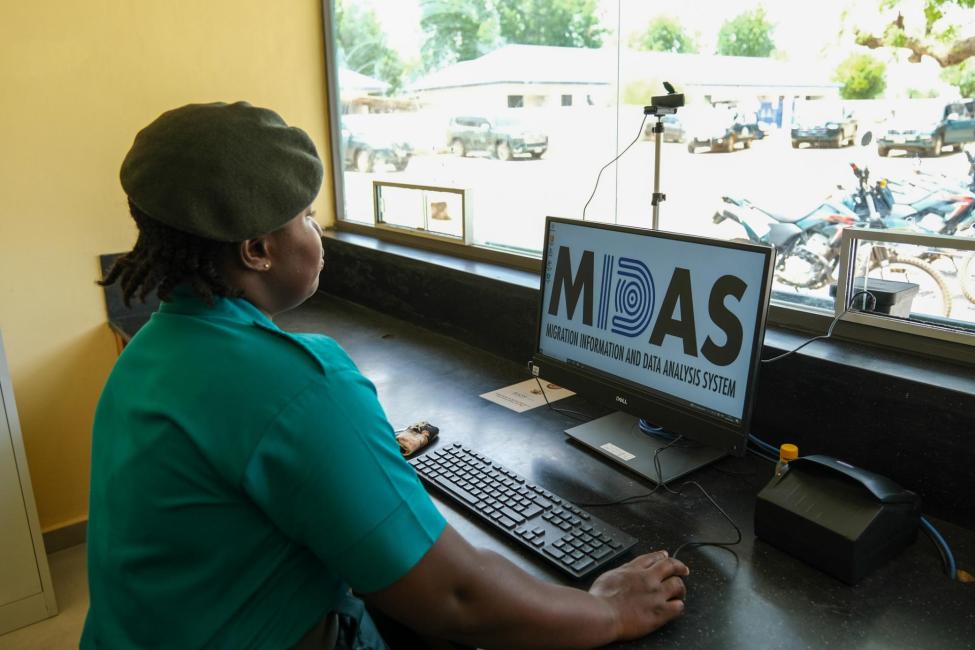-
Who we are
WHO WE AREThe International Organization for Migration (IOM) is part of the United Nations System as the leading inter-governmental organization promoting humane and orderly migration for the benefit of all. IOM has had a presence in West and Central Africa since 1998.
About
About
IOM Global
IOM Global
-
Our Work
Our WorkAs the leading inter-governmental organization promoting humane and orderly migration, IOM plays a key role to support the achievement of the 2030 Agenda through different areas of intervention that connect both humanitarian assistance and sustainable development. Across West and Central Africa, IOM provides a comprehensive response to the humanitarian needs of migrants, internally displaced persons, returnees and host communities.
Cross-cutting (Global)
Cross-cutting (Global)
- Where we work
- Take Action
- Data and Resources
- 2030 Agenda
Assistant Immigration Control Officer (AICO) II Priscilla Ampadu has been working as an immigration officer at the Mognori Sector Command of the Ghana Immigration Service (GIS) for over three years. On a daily basis, Priscilla works with travellers crossing the border between Ghana and Burkina Faso. Her job involves recording travellers data, diligently ensuring that each traveller meets the minimum requirement for entering and exiting the country in accordance with the country’s immigration laws and regulations.
Priscilla's job is demanding, requiring quick decision-making and attention to detail. Up to now, the data that immigration officers are required to collect from travellers has been recorded manually. Priscilla must write all the details of the travellers in a book and crosscheck also with other books which colleagues might have used. The introduction of the Migration Information and Data Analysis System (MIDAS) has come as a relief for her and colleagues. MIDAS is a user-friendly and customizable Border Management Information System (BMIS). It comes with the capability to collect, store, and analyse traveller information in real-time and across an entire border network.
“MIDAS has truly revolutionized the way we work, empowering us to capture data with ease. It saves time as well. At first, I was sceptical about it, but it has become an indispensable tool in my work, making my job easier and more efficient," said Priscilla.
Developed by the International Organization for Migration (IOM) in 2007, the MIDAS enables states to monitor more effectively individuals entering and exiting their territory while providing a sound statistical basis for migration policy-related planning. Currently operational in over 30 countries, MIDAS has been designed to be compliant with International Civil Aviation Organization (ICAO) and International Organization for Standardization (ISO) standards.
“With MIDAS, one can quickly verify the authenticity of travel documents, as well as identify individuals on national stop lists and international alert list. This is done within seconds, unlike before, when we had to flip through all the logbooks and also consult the official communication platforms at the command to check if the person is on the stop list. It could take several hours. The intuitive interface and user-friendly features of MIDAS makes it easy to check against the national and international alert lists, for instance Interpol,” Priscilla explained.
MIDAS automatically captures traveller’s biographic and biometric data using document readers, webcams, and fingerprint readers. This automation of data collection allows for faster and more accurate capture of information. MIDAS is completely customizable and can be tailored to the specific requirements of governments, be it the integration with Advance Passenger Information (API) systems, compatibility with an e-Visa solution, or the option to print visa vignettes and temporary travel cards.
“I didn’t know there was a system to make our work easy like this. During the workshop, we received hands-on training from IOM Ghana on how to navigate the MIDAS, and I must say, I was impressed, especially the interoperable ability and the possibility to check travellers against Interpol list is amazing! The trainer emphasized the importance of accuracy, efficiency, and adherence to the Standard Operating Procedures (SOP’s) when using MIDAS,” Priscilla mentioned.
As part of the MIDAS roll-out in Ghana, a customised training – tailored to the needs of the respective administrators, end users (front-line immigration officers) and IT focal points at the
various crossing points was delivered. IOM Ghana has so far trained over 100 immigration officers in the Upper East and Upper West regions of Ghana, specifically in Hamile, Kulungugu, Mognori, Namoo, and Pulmakom all located on the border with Burkina Faso.
Priscilla shared how the training has been helpful and how she is going to utilize the knowledge gained: “I have been using MIDAS for about a month now after we received the training, and it has made it easier to keep track of statistics, to streamline data collection and to enhance operational efficiency at this border checkpoint. We can leverage on this improved management of data to make informed decisions. I believe it can also help GIS’ HQ in advocacy and inform policies based on the data we collect.” She added: “The knowledge I have acquired now, will help improve my work on the field even in my next posting and I might even train others and share my knowledge.”
The workshop was funded by the Bureau of International Narcotics and Law Enforcement Affairs of the Government of the United States of America with the aim to enhance the capacity of GIS officers in managing migration data effectively and to make Ghana’s borders safer overall.


